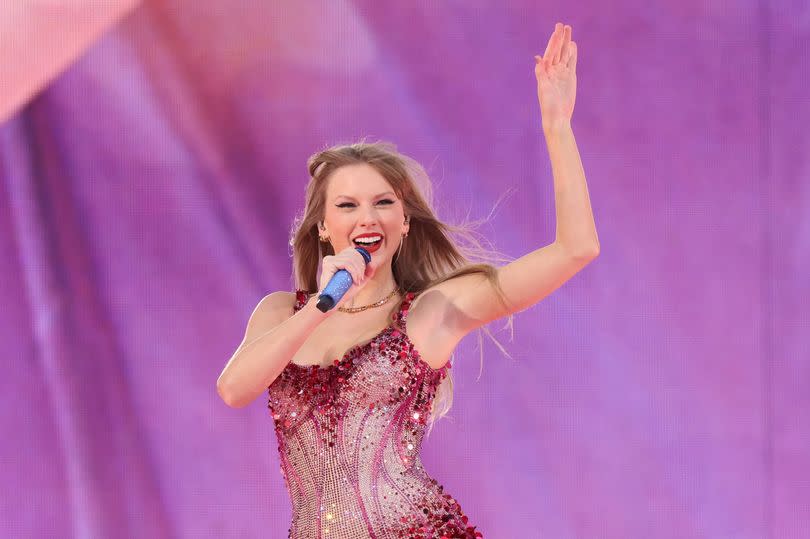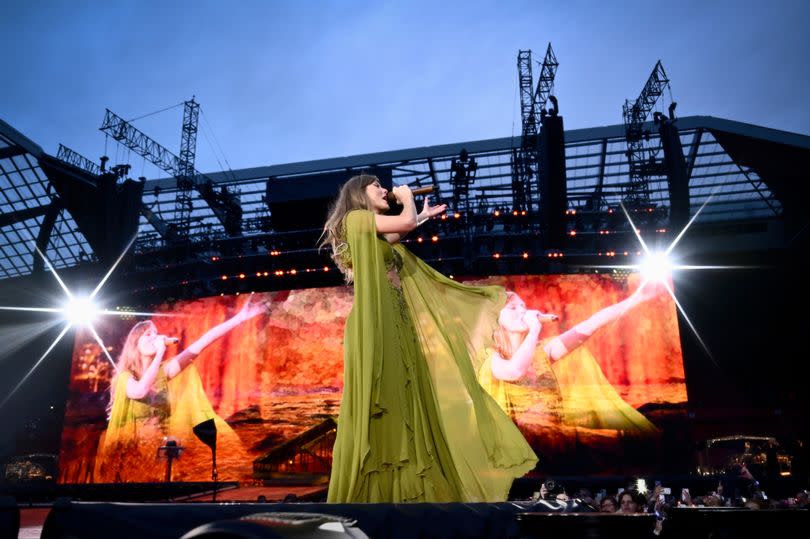Who is Taylor Swift? How a teen country singer became a global phenomenon

For some, the Taylor Swift frenzy in Cardiff this week is bizarre. Artists sell out the Principality Stadium all the time, but the red carpet wasn't rolled out for Springsteen, Sheeran or even Beyonce on quite this scale - and only for a one-night gig!
If you're reading this you probably don't quite understand it all. Why this specific artist, what's so special about her songs, how can it possibly be worth the hype and does she really have enough distinct 'eras' for a tour all about them? But many start from that point and soon find themselves praying that a specific non-album b-side from 2008 makes it into the 'surprise songs' part of her setlist - in other words it's dangerously easy to become a full-fledged Swiftie.
I'll admit, cautiously, that I was initially one of the skeptics. I think a lot of people heard Blank Space, Bad Blood and Shake it Off and quickly wrote Swift off as a generic vehicle for chart-friendly pop music. For up-to-date coverage of Taylor in Cardiff click here.
READ MORE: Taylor Swift in Cardiff: Huge Principality Stadium queue as fans take over city bridge
READ MORE: Girl in need of new lungs says seeing Taylor Swift's Eras Tour was 'once in a lifetime experience'
But most of what people attach themselves to is her songwriting - which at its core is emotional, laced with memorable lyrics and singalong-able bridges. Some artists release unmemorable new albums just as an excuse to tour and play the hits - but one on Swift's level can release a 31-song double album and have her fans hanging on the every word.
She's also fought for the rights to these songs, and is most of the way through re-releasing every one of her first six albums, the masters of which were sold off by her old label Big Machine Records, under the stewardship of her long-time foe Scooter Braun. This might seem like a cashgrab but to many fans it was a challenge to the masculine hegemony of the music industry - in other words a big "f*** you" to execs who play politics with singers' catalogues.
That sense of ownership over her own music exemplifies Swift's public image. She's fiercely proud of her catalogue and has, over the years, cultivated a relationship with fans that involved inviting them to her own house, keeping in touch with them on social media and even singing at their engagement parties.

Everything about her - the 'eras' of each album, the persona, the little breadcrumbs left for fans to figure out her next move - has been meticulously crafted, and she's nodded to this in her songs. Netflix's Miss Americana documentary showed a Swift who was anxious about saying the wrong thing, desperate to win awards and be recognised, and clearly driven to remain at the very top. But behind this veener there's the same earnestness of the teenager who toured Nashville with a guitar and a cassette tape trying to make it happen in the first place.
Swift was born into a decently well-off family but had to put in the hard graft to make it to the top - something respectable enough in itself. A great article in the Times recently explored how she did just that, and heard from people who knew she'd make it big as soon as they met her, then a kid who convinced her family to move to the spiritual home of music so she could chase her dream.
A professional singer at age 14, she reportedly first started making regular trips to Nashville with her mother to try and break into the country scene and would regularly be pretty far down the bill on a local country show trying to get her name out there. Many of her earliest songs were written at, or after, school - and it took her a few years of this to break her way in.
That's not to say she didn't have her parents' support or financial backing - but the appeal for many is that her success was earned. She's always been respected by some of the biggest names in music, right up to and including Paul McCartney, Carole King and Billy Joel. But her music has moved from being appreciated just by an in-crowd largely made up of teenage girls to something the whole world knows, and the 'how and why' of this is key to her stardom. Get your limited edition Taylor Swift OK! glossy mag here.
Her songs have often made references - subtle or otherwise - to her own personal heartbreaks. That'll annoy some people, although it's worth pointing out that male artists write about women quite a lot (and not always in the most flattering of tones) but in any case that's not really the point.
There will be a core of fans who get their kicks from picking through the bones of every breakup, the songs' appeal is much broader than mere gossip about the admittedly very famous people they're allegedly inspired by, among them Jake Gyllenhaal, Tom Hiddleston and Harry Styles. All Too Well began its life as a ballad on Swift's fourth album Red, largely buried by more commercially successful tracks like 22, We Are Never Ever Getting Back Together and I Knew You Were Trouble - but it took on a life of its own.
Becoming a cult classic among her fans over the years, the song became one of her best-loved because it wasn't really about Swift's quick-burning relationship with Gyllenhaal (although in literal terms it very much was). It spoke directly to anyone who had felt discarded, disregarded or left in shock after an intense love affair.
The lyrics - among them the searingly painful 'You call me up again just to break me like a promise / So casually cruel in the name of being honest" and "After plaid shirt days and nights when you made me your own / Now you mail back my things and I walk home alone" - were so relatable that the song transcended the subject matter. Taylor had spoken at times about a rumoured 10-minute original cut of the song, and after years of fan pressure she released it with her re-recording of Red.
The album shot to number one on the charts and All Too Well became the most talked-about song in the world, nine years after its original release. It didn't just get a music video but a whole short film; and every one of the 10 minutes of this sad, lyric-heavy ballad is now religiously belted out on an almost-daily basis at Taylor Swift-themed club nights across the world.

For a lot of casual readers this notion of Swift as a writer of nuanced, emotional lyrics might have passed them by but it's at the core of her songwriting. A lot of people's point of reference is the chart-storming 1989 album - with huge singles like Bad Blood and Shake It Off. But there's a huge depth to her discography; her debut is full of earnest (and slightly twee) country tunes, her sophomore album Speak Now had some real pop-punk tones and from Red onwards there was a pivot into pop - but lockdown saw the release of Folklore and Evermore, heavily influenced by producer Aaron Dessner (famous for making gutting, hollowly sad music with The National).
Reputation is an interesting case study here. It came out during an explosive feud between Swift and the then-couple Kim Kardashian and Kanye West - the terms and flashpoints of which are too complex to go into here. I'd taken some interest in Reputation but, having largely been disinterested in the Kanye West drama (beyond thinking that West was obviously in the wrong, with his "I made that b**** famous" lyrics) never really 'got' the album's deeper undertones.
Its biggest and most famous songs are all about the drama, and become the slightest bit cringey in the process. But the core of the album is in Swift's anxieties about how it affected her decidedly un-public relationship with Joe Alwyn. 'Will my relationship survive my public beef with the most famous rapper on the planet' isn't very relatable, but the idea of trying to fall in love while everything in your life falls apart is much more compelling.
READ MORE: What to expect as Taylor Swift comes to Cardiff with the Eras Tour
The metaphors aren't always subtle but they're usually compelling. Getaway Car is about the dangers of ditching a doomed relationship by running off with the next guy immediately - "Don't pretend it's such a mystery / Think about the place where you first met me." There's also some introspection in the breakup songs; Back to December is an apology penned to an ill-treated ex, Happiness is about seeing the good in a failed relationship and moving on, and It's Time To Go is about when moving on is the best thing for everyone.
It's not just the relationships, either; far from it. In Swift's 11-album catalogue there are songs about anxiety, her worries about growing up, her fear at her parents' health struggles, tributes to a three-year-old who died from neuroblastoma, the nerves of being a teenager in high school, and some pretty vicious messages to bullies. Lockdown's Folklore and Evermore albums were subtler, more folksy and often written about fictional characters of Swift's own creation.
In her catalogue there are many songs about the crushing scrutiny she, on a scale like few other artists, is placed under (both by the media and her fans). For those who have been there since the start, backing her through the Kanye controversy and some unfairly sneering takes about her music, this is gratifying - why should she have to answer questions not asked to other singers, purely to justify a fame that is, in any case, self-evident by the number of people queueing up to hear her perform?

Even in a fandom this big, there's still room for in-jokes and traditions. Back in the day you'd find fans making signs adorned with fairy lights - trying to catch the attention of Taylor's mother Andrea, who would stroll around the stadium finding the most dedicated fans to invite to meet Taylor after the show. Now it's all about the outfits - and the friendship bracelets (a tradition born from a throwaway lyric) which her fans eagerly make and swap at her shows.
For some, that simply won't be enough. They'll see a global megastar whose music leaves them cold, and there's no need to try and convince them otherwise. Nothing is for everyone. There are also hundreds upon hundreds of artists doing the same thing as Swift - writing acerbic, emotional music in huge quantities - and not getting the credit.
Swift might not be the individual best songwriter in the world (although many will argue it) but she's both the everywoman and the superstar. That's a winning combination.

 Yahoo News
Yahoo News 
